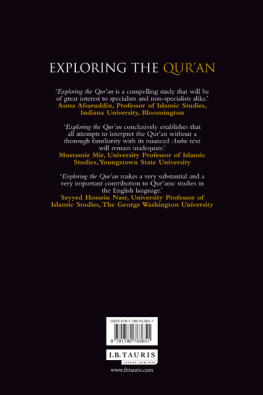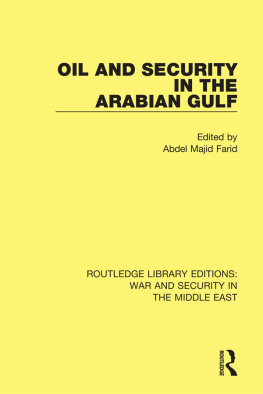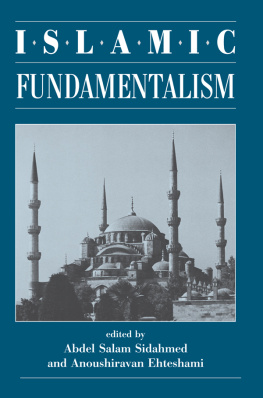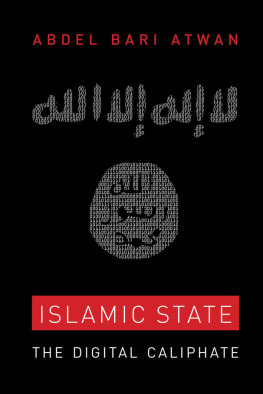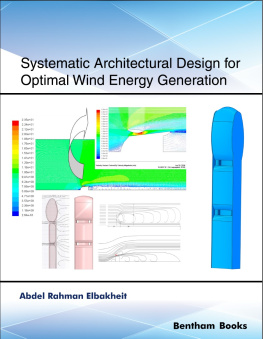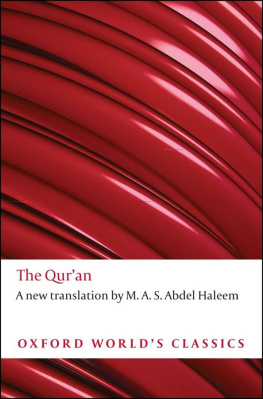Muhammad Abdel Haleem - Exploring the Qur’an : Context and Impact
Here you can read online Muhammad Abdel Haleem - Exploring the Qur’an : Context and Impact full text of the book (entire story) in english for free. Download pdf and epub, get meaning, cover and reviews about this ebook. City: London, year: 2017, publisher: I. B. Tauris., genre: Religion. Description of the work, (preface) as well as reviews are available. Best literature library LitArk.com created for fans of good reading and offers a wide selection of genres:
Romance novel
Science fiction
Adventure
Detective
Science
History
Home and family
Prose
Art
Politics
Computer
Non-fiction
Religion
Business
Children
Humor
Choose a favorite category and find really read worthwhile books. Enjoy immersion in the world of imagination, feel the emotions of the characters or learn something new for yourself, make an fascinating discovery.
- Book:Exploring the Qur’an : Context and Impact
- Author:
- Publisher:I. B. Tauris.
- Genre:
- Year:2017
- City:London
- Rating:3 / 5
- Favourites:Add to favourites
- Your mark:
- 60
- 1
- 2
- 3
- 4
- 5
Exploring the Qur’an : Context and Impact: summary, description and annotation
We offer to read an annotation, description, summary or preface (depends on what the author of the book "Exploring the Qur’an : Context and Impact" wrote himself). If you haven't found the necessary information about the book — write in the comments, we will try to find it.
Exploring the Qur’an : Context and Impact — read online for free the complete book (whole text) full work
Below is the text of the book, divided by pages. System saving the place of the last page read, allows you to conveniently read the book "Exploring the Qur’an : Context and Impact" online for free, without having to search again every time where you left off. Put a bookmark, and you can go to the page where you finished reading at any time.
Font size:
Interval:
Bookmark:

List of Tables
Muhammad Abdel Haleem, OBE, is King Fahd Professor of Islamic Studies at the School of Oriental and African Studies, University of London, and one of the worlds leading authorities in Quranic studies. He is the author of Understanding the Quran: Themes and Style, also published by I.B. Tauris, and his major new translation of the Quran, with parallel Arabic text, was published by Oxford University Press in 2010.
This is a learned yet accessible work born of deep erudition and familiarity not only with the complexities of the Arabic language but also with the underlying spirit of Islamic thought and tradition. At a time when Muslims are assailed from within and without by zealots intent on denigrating their faith, Professor Haleems book provides thoughtful and incisive counter-arguments to their heated rhetoric. The reader cannot help but be impressed by the authors careful and insightful engagement with some of the most important Quranic verses that are being deliberately misconstrued today, by extremists from both Muslim and non-Muslim backgrounds. Exploring the Quran is a compelling study that will be of great interest to specialists and non-specialists alike.
Asma Afsaruddin,
Professor of Islamic Studies,
Indiana University, Bloomington
Exploring the Quran: Context and Impact combines a judicious critique of aspects of Western Quran studies and aspects too of the Quranic exegetical tradition with an acutely perceptive and detailed analysis of the language and thought of the Quran. It conclusively establishes that all attempts to interpret the Quran without a thorough familiarity with its nuanced Arabic text will remain inadequate. Muhammad Abdel Haleems important and groundbreaking book makes a singular contribution to Quranic studies.
Mustansir Mir,
University Professor of Islamic Studies,
Youngstown State University
Muhammad Abdel Haleem is one of the foremost Arabists and scholars of the Quran today. His translation of the Islamic sacred scripture is widely known and appreciated, as are his other scholarly works. The present volume, again dealing with the Quran, is a major addition to his corpus and to literature in the field in general. This new book reflects mastery of the material as well as deep faith in the sacred nature of the Quran itself. Exploring the Quran makes a very substantial and a very important contribution to Quranic studies in the English language.
Seyyed Hossein Nasr,
University Professor of Islamic Studies,
The George Washington University

Published in 2017 by
I.B.Tauris & Co. Ltd
London New York
www.ibtauris.com
Copyright 2017 Muhammad A. S. Abdel Haleem
The right of Muhammad A. S. Abdel Haleem to be identified as the author of this work has been asserted by the author in accordance with the Copyright, Designs and Patents Act 1988.
All rights reserved. Except for brief quotations in a review, this book, or any part thereof, may not be reproduced, stored in or introduced into a retrieval system, or transmitted, in any form or by any means, electronic, mechanical, photocopying, recording or otherwise, without the prior written permission of the publisher.
Every attempt has been made to gain permission for the use of the images in this book. Any omissions will be rectified in future editions.
References to websites were correct at the time of writing.
ISBN: 978 1 78076 365 1
eISBN: 978 1 78672 165 5
ePDF: 978 1 78673 165 4
A full CIP record for this book is available from the British Library
A full CIP record is available from the Library of Congress
Library of Congress Catalog Card Number: available
Typeset by Riverside Publishing Solutions, Salisbury, SP4 6NQ
Acknowledgements
Some of the chapters in this book are elaborations on my previously published material. I would like to acknowledge the kind permission of:
Edinburgh University Press (Chapters 2, 3, 6, 7 and 8). Published in various issues of the Journal of Quranic Studies.
E. J. Brill (Chapter 4). In their forthcoming book, Sebastian Gnther and Todd Lawson (eds), Roads to Paradise.
(Chapter 10). Published as Arabic of the Quran: grammar and style, in C. Versteegh (general ed.), Encyclopedia of Arabic Language and Linguistics (Brill 2009), Vol. IV (QZ), Quran, pp. 2132.
Harper Collins (Chapter 11). Published as Quranic Arabic: its characteristics and impact on Arabic language and literature and the languages and literatures of other Islamic peoples, in Seyyed Hossein Nasr (ed.), The Study Quran (New York, 2015), pp. 162643.
I would also like to thank Hannah Erlwein, who formatted the whole final text and made very good suggestions, My most sincere thanks go to my wife, Harfiyah, who has typed every part of the material throughout and has also made many useful suggestions, Many thanks for her patience and encouragement.
Introduction
This book challenges the image of the Quran put forward by many Western and Muslim authors, both classical and modern, and particularly by modern extremists from all sides. It argues that the image they produce is highly selective, hastily produced and actually ignores important parts of the Arabic text of the Quran, sometimes even from within the same verse from which they are quoting. At times they ignore the context, style and rhetorical aspects of the Quran that are essential for determining the correct meaning. They often force norms of Arabic grammar and rhetoric on to the English, producing an Arabised, rather than an eloquent English translation, while also disregarding the power of the original Arabic. Sometimes they overlook the Quranic text and base their views on the tradition of exegesis (tafsr) or images and ideas that have accumulated in the West over centuries. Those who do this unwittingly emulate the pagan Arabs, described by the Quran as follows:
When it is said to them, Follow the message that God has sent down, they answer, We follow the ways of our forefathers. What! Even though their forefathers understood nothing and were not guided?
Q. 2:170
They say, We saw our fathers following a tradition; we are guided by their footsteps.
Q. 43:22
The present book explores what such writers have neglected, that is, the Arabic text of the Quran itself, rather than views expressed in imperfect tafsrs or translations, or polemical readings of the text which subvert its original meaning. Linguistic analysis is then used, paying due regard to the Quranic context, style and habits of expressing its message. The objective is to challenge tradition or convention where it stands in contradiction to the Quran; however, just as my intention is not to criticise all Muslim writers, it is certainly not my aim to criticise all Western writers on the Quran either, many of whom, based on the rich cultural heritage existing in various Western countries, have made significant contributions to Quranic studies, They have complemented the scholarship of Muslim authors and have expended huge efforts enriching our understanding of the text, especially when such scholarship has been marked by true academic objectivity.
The material in this book is presented in three categories: teachings, style and impact. The first part (Chapters , have been selected because Western authors themselves have highlighted them in their discussions on the Quran,
discusses the so-called Sword Verse to show that a web of myth has been created around it, based on the selection of one single verse, cutting it off from its textual context before and after, and also its historical context, This has led to a misunderstanding of the purpose of the words within that verse, In fact, not one single person was killed as a result of this verse at the time it was revealed, For polemical reasons, what the Quran actually says on the subject has been ignored.
Next pageFont size:
Interval:
Bookmark:
Similar books «Exploring the Qur’an : Context and Impact»
Look at similar books to Exploring the Qur’an : Context and Impact. We have selected literature similar in name and meaning in the hope of providing readers with more options to find new, interesting, not yet read works.
Discussion, reviews of the book Exploring the Qur’an : Context and Impact and just readers' own opinions. Leave your comments, write what you think about the work, its meaning or the main characters. Specify what exactly you liked and what you didn't like, and why you think so.

